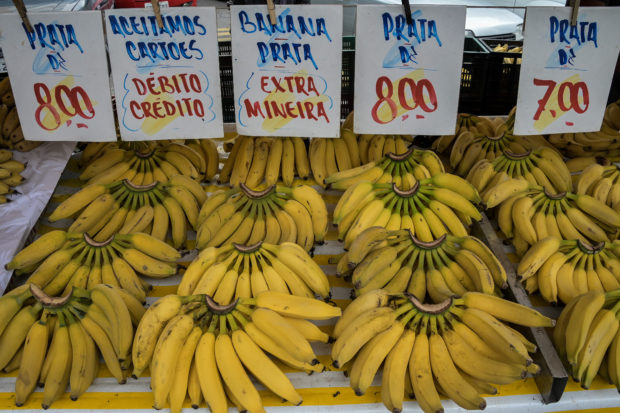Rising food prices in Brazil hit the neediest most

Bananas are displayed at the Feira Livre market on the streets of the Liberdade neighbourhood in Sao Paulo, Brazil on September 22 , 2021. – Rising food prices on top of already high inflation became a daily challenge for the most vulnerable Brazilians. Many adjusted their diet to cope with the rising costs. (Photo by NELSON ALMEIDA / AFP)
SAO PAULO — Marli Fumagalli looks at prices carefully as she walks through a market in Brazil and says her dietary mantra in hard times like these is “less beef, more vegetables and lots of creativity.”
Inflation is running high in Latin America’s largest economy but it is even worse for foodstuffs, and this has become a daily challenge for the most vulnerable people.
Many people, like Fumagalli, a retiree who lives on a small pension, have changed the way they eat in order to cope with the higher prices.
READ: High inflation seen hounding Philippines’ recovery
“My bank account is always overdrawn,” said Fumagalli, 69, who has to feed her mother and two daughters, besides herself.
Article continues after this advertisement“I only have enough to buy inferior cuts of meat and use it as stuffing to make it go further,” she said.
Article continues after this advertisementAs of August the consumer price index had risen 9.68 percent in the past 12 months, but food prices shot up by nearly 14 percent in that same span, government figures show.
“Food inflation is exerting pressure on family budgets since 2020, especially lower income people,” said Joelson Sampaio, an economics professor at the Getulio Vargas Foundation.
The foundation’s figures from April show that 27.7 million people in Brazil — 13 percent of the population — live below the poverty line. In Brazil, that is set at 261 reales a month, or $49.
The proportion of poor people is up from 11 percent in 2019.
Red meat is a treat
At the market where Fumagalli shops, vendor Jose Guerreiro says he offers less and less beef and lots of chicken in its place. “I try to avoid raising prices by switching suppliers, but it is pointless, Guerreiro said. “It is a snowball.”
Prices of red meat have gone up three times that of the overall inflation rate.
That means a lot of people have stopped buying it, even though Brazil has more cattle than any other country in the world and is its main beef exporter.
A recent survey by pollster Datafolha found that 85 percent of Brazilians have reduced their consumption of some kind of meat this year, and 67 percent ate less red meat.
Around 35 percent ate less rice and beans, which are staples in the Brazilian diet.
“The first reaction of consumers is to substitute. The second is to cut back, and the last is to rule out altogether,” said Sampaio.
A poll in late 2020 by Rede PENSSAN, a network that does research on food insecurity in Brazil, showed that 116.8 million Brazilians were in fact suffering from some degree of food insecurity and 19 million endured hunger. The total population is 213 million.
Inflation and unemployment, which now stands at 14.1 percent, have not helped things. Glaucia Pastore, a professor of food engineering at Campinas University, said that because of those two factors “the food that a large part of the population eats does not meet standards on nutrition or quantity.”
And eating just enough to get by has consequences, he said.
“People are more likely to suffer from viral or non-transmissible chronic diseases such as diabetes, heart trouble or others,” said Pastore.
‘Bolsocaro’
The opposition blames the high rate of inflation on right-wing President Jair Bolsonaro, and has come up with a play on words with his name to express their argument that life under him is pricey — Bolsocaro, with “caro” meaning expensive.
The government in turn says inflation is a result of higher international prices for foodstuffs.
Carlos Cogo, who runs a farm business consultancy called Cogo, said most basic foodstuffs that are contributing to inflation are commodities sold in dollars on the international market and on the rise since the start of the Covid pandemic.
And the Brazilian real is depreciating, he notes. It took 4.2 of them to buy a dollar in February 2020, but now you need 5.3.
Rising commodity prices and the fall in the real have led to higher inflation than the international average, said Cogo.
But there are other factors too, such as higher prices for fuel — they are up 41.3 percent on the year through August, and this affected transport costs, as well as the historic drought that Brazil is enduring.
This dry weather has affected crops such as corn, which is key to feeding livestock, and has pushed up electricity costs, which is then passed along through the production chain, said Cogo.
He predicted that pressure on food prices will continue at least until 2022-2023, which could force more Brazilians into hunger.